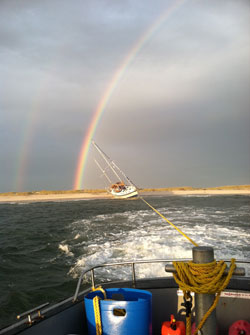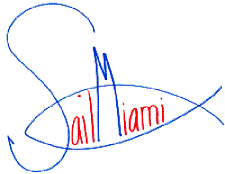Savvy Boaters Know The Difference Between "Towing" And "Salvage"
Who Pays for Each?
Posted Tuesday, February 26, 2013

ALEXANDRIA, Va. February 26, 2013 -- On-the-water breakdowns, running aground or other mishaps can ruin a day of boating or fishing fun. But when the towboat arrives on the scene, do you know if the service is a "tow" or a "salvage" job? If you?re ever in doubt, the safest bet is to ask the towboat crew. That?s because there could be a big difference in the cost of each service, and it also determines who pays the bill, says Boat Owners Association of The United States (BoatUS).
While there is sometimes a fine line between the towing and salvage, there are a few clear indicators that point to each. "Salvage requires the existence of ?peril? to the distressed vessel or persons aboard, or peril to the rescue boat and its crew, or the marine environment," said Vice President of BoatUS Towing Services Adam Wheeler.
Historically and legally, salvage is any voluntary and successful rescue of a boat, its cargo, and/or passengers from peril at sea. Today that definition includes the successful avoidance of damage to a legally protected marine environment.
Vessels hard aground, on rocks, taking on water or sunk are salvage, as are collisions, fires, breakaways or other types of immediate danger. Salvage also comes into play when specialized equipment such as pumps, air bags, or divers are called for - even if the boat is at the dock.
All TowBoatUS and Vessel Assist companies are committed to informing the owner of a boat - before beginning any work - if the procedure will be declared salvage. If the owner is not on board or the conditions are so perilous and the rescue of the boat requires immediate action, they?ll be notified as soon as possible after saving the boat.
"On the other hand, when there is very little or no peril or damage to the vessel - you have a towing situation," said Wheeler. "A typical example is when you run out of gas or have a dead battery, and have subsequently dropped anchor to await assistance. Waters are calm, you?re no threat to navigation, your crew and boat are fine and there?s no peril to those on the response boat." Of the 65,000 requests for assistance made last year by boaters to BoatUS 24-hour Dispatch Centers, 98% were for routine towing services.
When it comes to soft ungroundings, BoatUS members enjoy a special agreement with the TowBoatUS and Vessel Assist on-the-water towing fleets which ensures that if there is little peril and no damage to the BoatUS member?s disabled boat, and only one towboat is needed to remove the softly grounded vessel from a shoal, it?s a simple towing job. Other commercial towing companies may or may not honor this agreement.
The Costs
Nationwide, towing and soft ungrounding costs average about $600 and $800, respectively. These are either paid by an annual towing service plan or out-of-pocket by the boater.
Salvage cases are usually covered by insurance - or out-of-pocket if self-insured - and are much more expensive than a tow. Salvage continues to be the way to award a rescuer who maintains a 24-hour state of readiness to risk life, limb and vessel for others, and often results in a charge based on the length of the vessel saved or a request for a percentage of the boat's post-casualty value. While it?s a reward for extraordinary service, the dollar amount awarded factors in the degree of peril as well as the risk to the salvor and their crew.
"There are significant expenses in operating and maintaining a professional towing operation," says Wheeler, "such as Captain?s and staff salaries, insurance, equipment maintenance and increasing fuel costs, not to mention capital expenses such as towboats and other specialized recovery equipment - and it all has to be ready to go at a moment?s notice," he added.
Time and circumstances permitting, Wheeler suggests that if it?s a salvage job, boaters should try to call their insurance company so they may attempt to negotiate with the salvor before the operation gets underway. If circumstances don?t allow this, ask the salvor for a fixed price and try to get it in writing.
Wheeler also says that boaters should review their boat?s insurance policy to ensure it fully covers salvage. Some policies have limits, high deductibles, or may not include environmental damage - all of which would have to be paid out of pocket.
BoatUS also suggests having a copy of the BoatUS Open Form Yacht Salvage Contract aboard at all times, which assures that any salvage claim will go to local binding arbitration if negotiations between your insurance company and salvor fails. Designed to be more understandable, relevant to US laws and potentially money saving for all parties, the Open Form Contract is available free of charge at BoatUS.com/salvage or by calling 800-937-1937.
For more information on BoatUS towing plans, go to BoatUS.com/towing or call 1-800-888-4869.
FOUR SALVAGE TIPS:
*Protect yourself by having both a towing service plan for basic towing assistance needs and an insurance policy that fully covers the costs of salvage.
*If you do have an incident, ask questions first, not later, to confirm whether the job is towing or salvage.
*Have your insurance claims department phone number aboard. If it's salvage, you'll want to try to contact them to help negotiate a fixed price.
*When all else fails, have a copy of BoatUS Open Form Yacht Salvage Contract aboard. You can get one for free at BoatUS.com/salvage.
FL House Committee Bill HWSS 15-06 Has New Number: HB 7123
Important info if you will be watching fireworks from the water in Miami
A simple, but effective tool for when emergencies happen.
FWC Online Survey Closes Today. Dec. 7
Nationwide crackdown focuses on critical safety issue affecting our local waters
Contact ~ About ~ Advertise ~ Privacy Policy ~ FAQ
Toll free 1-877-228-1569 ~ In South Florida 786-525-3545
Copyright© 1999 - 2015 Atlantic Coast Boating

